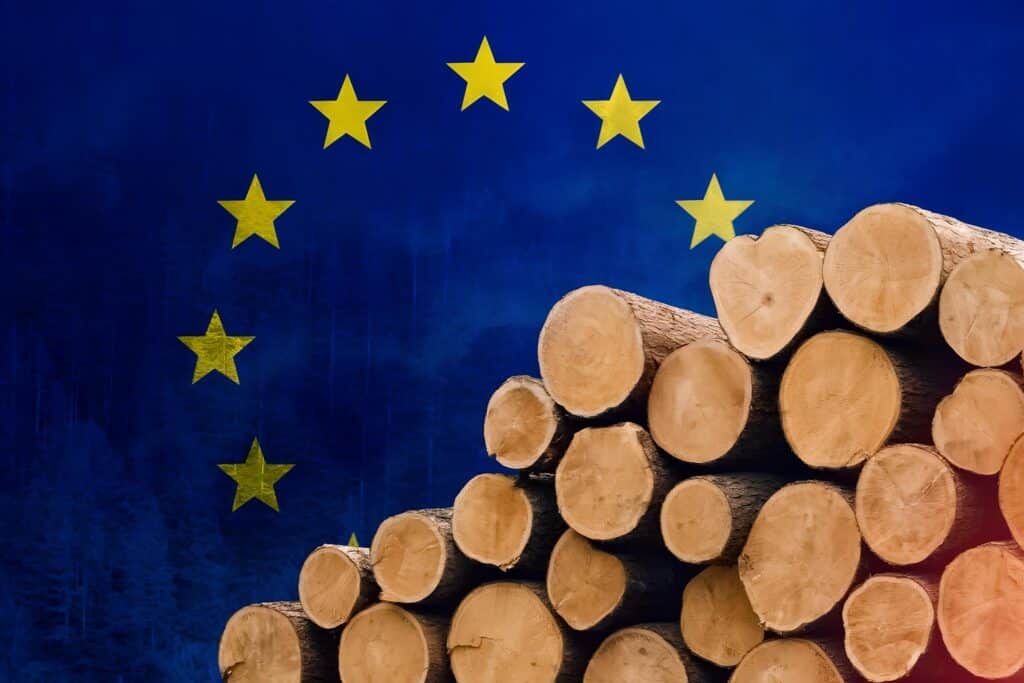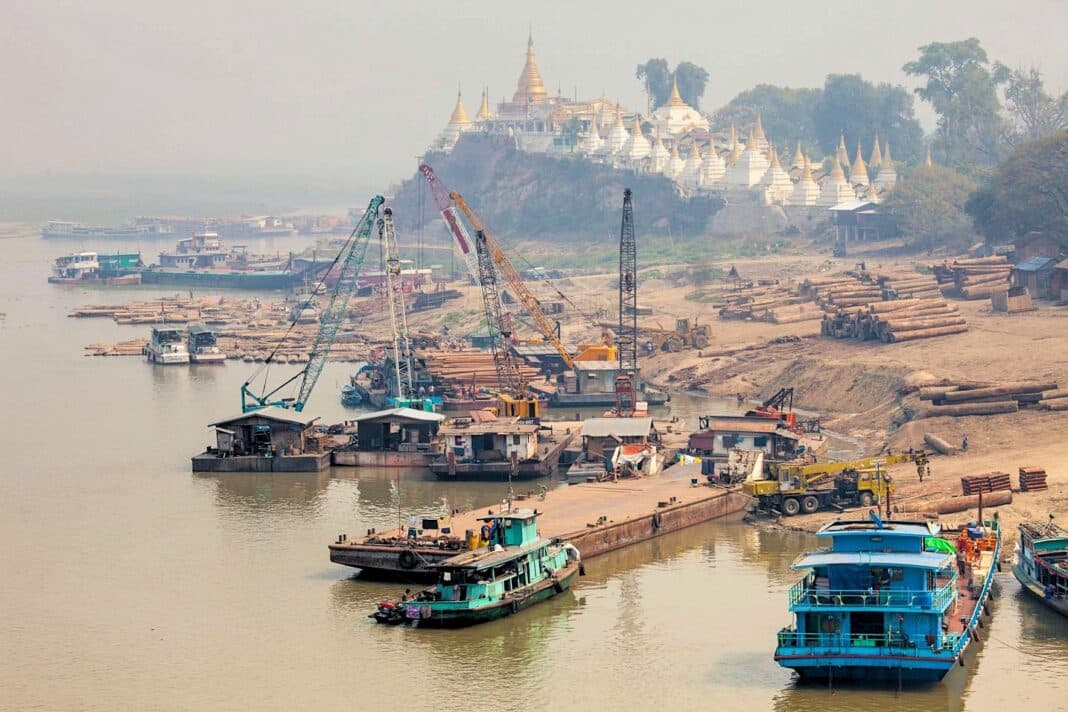Just months before the introduction of the EUDR, the Irrawaddy River has emerged as a major flashpoint for conflict timber, with more than 100 tons – and sometimes up to 150 tons – of teak and other species leaving Myanmar ports every week.
This timber often smuggled across the border, is then traded into Western Markets via China, India and Indonesia, with the proceeds used to fuel the oppressive regime.
In recent years, China has emerged as the junta’s major economic lifeline, and according to Myanmar’s Ministry of Commerce, the bilateral trade between April 2022 and half of January 2023 reached up to US $2 trillion.
Myanmar is a crucial part of China’s Belt and Road Initiative, with the UN reporting that China’s proportion of imports from Myanmar has increased by 35% since the military takeover – notably, this includes timber and, more specifically, teak – with Maynmar supplying 40% of the world’s supply (Tectona grandis).
According to Global Witness, in the year before the coup, 80% of Myanmar’s illegally logged timber was smuggled to China and India, with China accounting for the lion’s share of these flows.
“This, however, is expected to lead to strengthened ties between business communities on both sides of the border, with the province of Yunnan continuing to play its traditionally instrumental role in mediating illicit transactions between China and Myanmar,” Global Witness said.
From the state of Kachin in Myanmar to China’s Yunnan province, the illegal timber trade is worth more than US $600 million – however, this could be as much as US $1 billion when accounting for Chinese-owned timber interests across the Asia Pacific – especially Indonesia.
It comes as the UN late last year warned that the ongoing conflict in Myanmar has not only caused a human tragedy but is also an environmental catastrophe.
“World leaders must help end the crisis in Myanmar by supporting communities to mitigate climate impacts,” the experts said at the outset of the 28th Conference of the Parties to the UN Framework Convention on Climate Change (COP28) in the United Arab Emirates in December.
“Increasingly isolated from the global economy and strapped for cash, the military junta has accelerated the exploitation of Myanmar’s natural resources, including timber, jade, and rare earth minerals, to fund its human rights abuses.”
“Growing resource extraction, often unregulated and facilitated by the military or other armed groups, is degrading the environment, polluting water sources, ravaging forests, and exacerbating climate change risks,” the experts said.

In November, Europol seized a cargo of Myanmar timber, which they claim had been smuggled into the bloc illegally. And whilst the finding was small, it pointed to a far more troubling problem: the persistence of illegal timber infiltrating European ports despite Western sanctions.
Italy is the EU’s top consumer market for Myanmar timber
When it comes to ground zero, Italy is Europe’s number one destination for teak and other controversial forest products. Between January and October 2023, Italian companies imported more Myanmar wood products than any other European country — about $3.3 million worth — used in furniture and construction, according to Italian government data analysed by the FederlegnoArredo – Italy’s national timber trade association.
The imports, including teak, came two years after the EU imposed sanctions on the Myanmar state firm with a monopoly on timber production – which itself was long after a European panel of experts recommended a ban on all trade in Myanmar timber due to illegal logging.
Now, a new analysis by Deforestation Inc., a cross-border investigation led by ICIJ, has documented how Western governments have failed to stop the trade of wood logged in Myanmar, which has allowed authoritarian regimes to finance their violent rule.
According to the junta-controlled commerce ministry’s accounting, Myanmar exported $235.6 million worth of timber from October 2021 to mid-2023 – amid concerns that conflict teak has been fitted bow to stern in Jeff Bezos’s US $400m mega yacht.
Over the past three years, Myanmar teak has emerged as a vital source of revenue for the junta, leading Alessandro Calcaterra to stress that “current imports of Myanmar teak into Italy should be down to zero.
Yet Mr Calcaterra, FederlegnoArredo’s director for Forests and Forest Certification and president of Italy’s wood-product importers and retailers trade association, told ICIJ Italian media partner, L’Espresso that Italian companies “continue to import Myanmar teak via third parties in countries such as Indonesia and India.”
And they are not alone; ICIJ reports that US companies and individuals were responsible for importing at least 300 tons of Myanmar teak shipped out of Yangon, the country’s commercial hub, in 2023.
According to the ICIJ report, now available for download, the US imports came after the US government introduced trade sanctions mid-last year, which, according to Brian Nelson, the US Treasury Under Secretary for Terrorism and Financial Intelligence, targeted companies providing state-run access to import weapons and equipment, including from sanctioned Russian entities, to continue its violence and oppression.”
Human rights groups and international organisations now say those revenues finance the military regime that has killed, injured or forced into exile thousands of civilians – with Myanmar one of the countries with the highest rates of deforestation, according to the Forest Declaration Assessment, a coalition of conservation organisations.
After ICIJ and its media partners published their findings, the US Justice Department announced the creation of an interagency task force to bolster efforts to combat the trade of wood products of illegal origins.
Is EUDR the solution to the EU’s conflict timber and deforestation question?
EU officials told reporters that the European Commission was in “active dialogue” with member states facing “challenges of enforcement,” with the November cargo seizure part of a crackdown on contraband timber products across nine EU and Latin American countries.
But, even as imports dropped by more than 80% last year, EU officials publicly acknowledge a “problem” remains.

Overall, European companies still imported at least $6 million worth of wood products from Myanmar, according to the data shared by the Italian trade association, with Yadanar Maung, a spokesperson for Justice for Myanmar, saying that “far more needs to be done.”
“It’s unacceptable that Myanmar teak imports to the US and EU are happening at all” three years after the coup, Maung told ICIJ, adding that “the sale of teak helps the junta pay for the bombs and jet fuel it needs to slaughter Myanmar people.”
“No yacht is worth the price of blood Myanmar people are sacrificing for this abhorrent trade,” he said.
However, timber industry representatives hope that a new EU law, the EU Deforestation Regulation, could be a silver bullet to eradicate conflict trade.
Under the new law, the European companies importing palm oil, rubber, wood and other commodities to be able to prove the products did not originate from deforested land or contribute to forest degradation.
The law also requires national authorities to conduct regular checks and act swiftly against companies that don’t comply; penalties include fines of up to 4% of a company’s annual turnover.
EU lawmakers say that the new regulations, which are the first of its type anywhere in the world, “should help reassure European consumers that their furniture, chocolate bars or cups of coffee have not contributed to destroying precious rainforests on the other side of the world.”
For Johannes Zahnen, an environmental engineer who works for the conservation organisation World Wildlife Fund, the new EU law represents a potential “step forward” in the fight against deforestation, but only if properly implemented.
The law can be “a lever to minimise forest destruction,” Zahnen told NDR. However, if governments don’t allocate enough staff, “that would be a first indicator that the EUDR is not being taken seriously,” he said. “That would be a disaster.”
So, how does the junta trade timber into Western Markets?
In September, Wood Central revealed that The Myanma Timber Enterprise (MTE) was working to open secret bank accounts at the Myanmar Economic Bank (MEB) weeks after the United States imposed sanctions on two banks with links to the military.
Wood Central understands that the government officials used MTE and third-party bank accounts to access the proceeds from the timber smuggled into western markets.
The revelations come from the Irrawaddy, a news website run by Burmese exiles living in Thailand, who allege that the MTE, already sanctioned by the European Union, the United States and the UK, is working to use MEB bank accounts to bypass international financial sanctions.
“As they can no longer use the MFTB and MICB, the MTE is planning to make transactions through the MEB,” an informant told Irrawaddy.
“It will be able to make transactions by linking through 15 foreign banks.”
The publication alleges that “the secret bank account will be linked with banks in Singapore, Thailand, Japan, India and China for international transactions, with local banks used for domestic transactions.”
“No other bank in Myanmar can match the MFTB in terms of international acceptance for transactions,” said a local economist and banking expert.
“All the other [domestic] banks still operate as subsidiaries of MFTB, so the sanction against MFTB will also restrict the operations of other banks.”
According to an unnamed economist, “The regime can shift accounts of state-owned enterprises to other banks to bypass financial sanctions, but it will inevitably incur higher transaction costs.”
- Please note that Wood Central could not verify information relating to the secret bank accounts but is instead reporting information provided by Irrawaddy.







